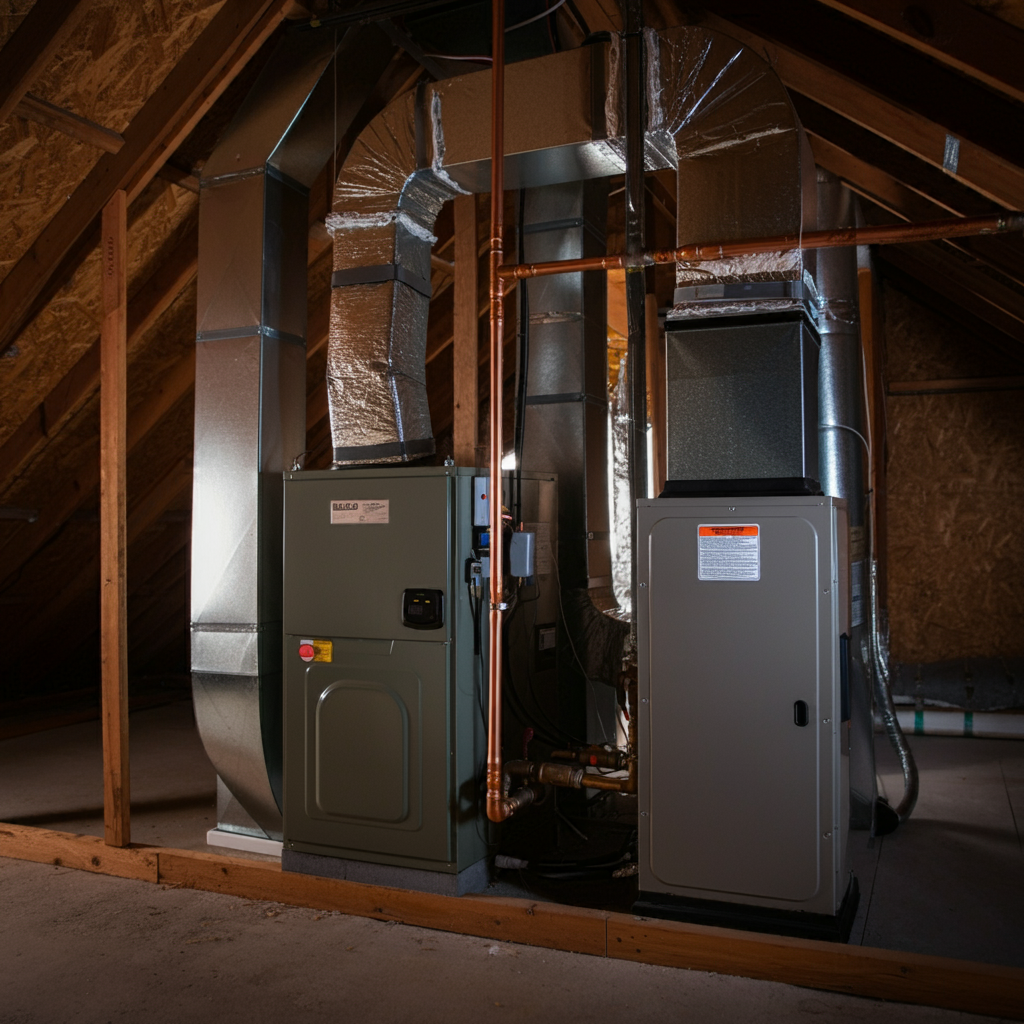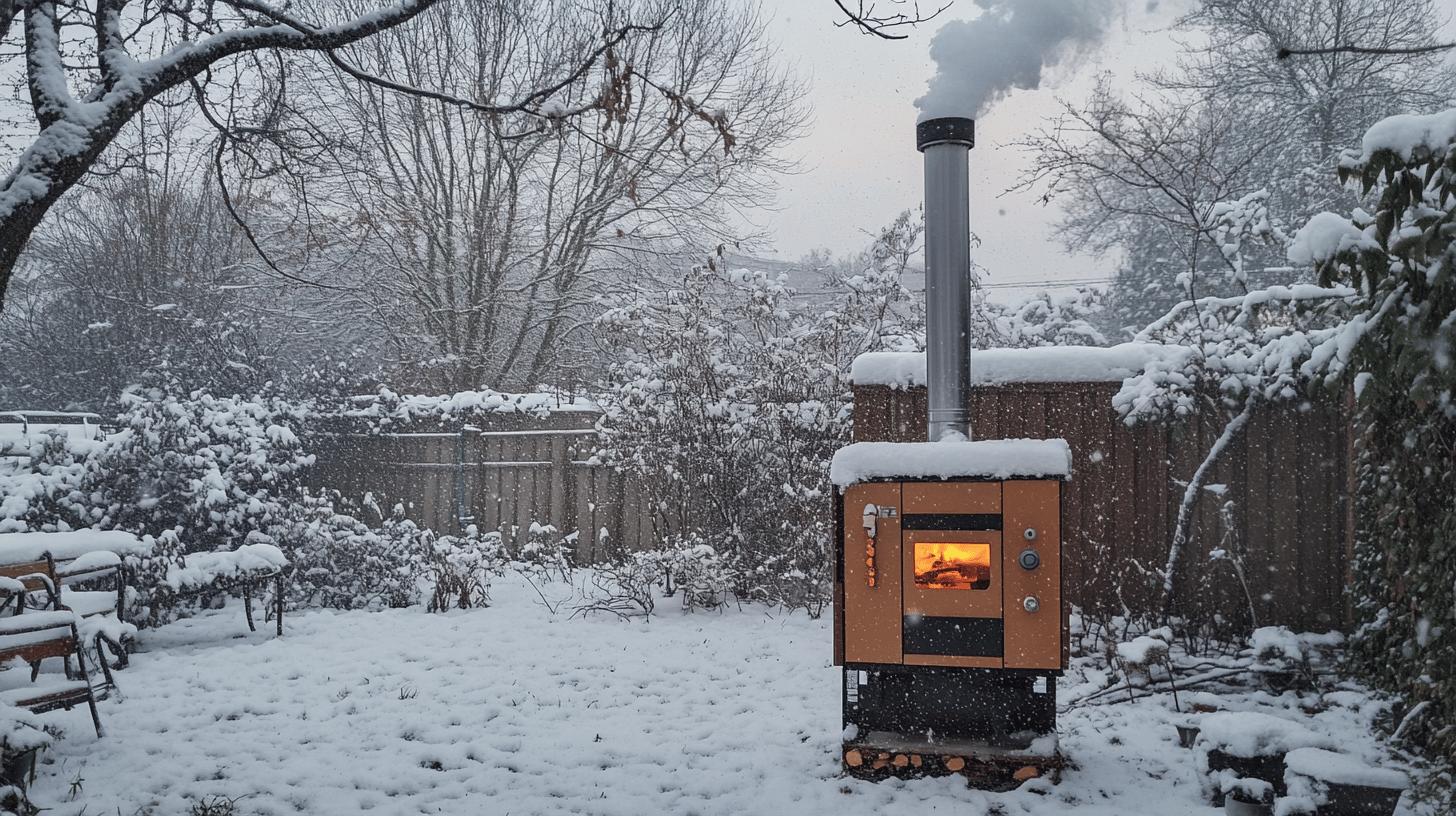When faced with different features and costs, deciding between these two heating solutions can be challenging. Both systems have unique benefits, with the furnace offering focused heating and the HVAC system delivering a complete climate control solution. In this article, you’ll explore the key differences between a furnace and an HVAC system and discover which option fits your home and lifestyle. Get ready to make an informed decision for optimal comfort and efficiency!
Understanding the Differences: Furnace vs HVAC System
A furnace is a heating device that works by burning fuel, such as natural gas or oil, or using electricity. This heat spreads through ducts in your home, providing reliable warmth. Furnaces are ideal in colder climates where heating is crucial. They offer efficiency ratings ranging from 80% to 98.5%, depending on the model and fuel type.
Meanwhile, an HVAC system stands for Heating, Ventilation, and Air Conditioning. It offers a full indoor climate control solution, managing heating, cooling, and air quality. Typically, an HVAC system includes components like a furnace or heat pump for heating and an air conditioner for cooling. It uses ductwork to circulate air throughout the building. HVAC systems provide both heating and cooling, making them perfect for areas with changing seasons.
- Functionality: Furnaces only heat; HVAC systems both heat and cool.
- Components: A furnace has a burner, heat exchanger, and blower fan. HVAC adds cooling and ventilation parts.
- Purpose: Furnaces focus on heating; HVAC manages the entire indoor climate.
- Installation Complexity: HVAC needs professional installation, unlike simpler furnace setups.
- Cost: Furnaces are cheaper upfront if you only need heating. HVAC systems cost more but offer multiple functions.
Pros and Cons: Choosing Between a Furnace vs HVAC System

When considering a furnace, think about its efficiency and cost-effectiveness. Main advantages of a furnace? They’re generally cheaper for just heating, costing $2,500 to $7,500. Furnaces are designed for colder climates, providing consistent warmth. Modern furnaces achieve high efficiency (AFUE ratings of 80% to 98.5%). Drawbacks? They only heat, so you’ll need another system for cooling.
HVAC systems offer a complete approach to indoor climate control. Why choose HVAC over a furnace? These provide heating and cooling, useful for regions with seasonal temperature changes. HVAC efficiency is measured by the SEER, ensuring year-round operation. Disadvantages? Higher initial costs (typically $5,000 to $12,000) due to multiple functions and complex installation.
Comparing costs and efficiencies? Furnaces are budget-friendly if you only need heating, with lower upfront costs and focused maintenance. In contrast, HVAC systems have a higher initial investment but dual functionality. They can save on separate cooling installations, suitable for hot and cold climates, though they require more maintenance over time.
Cost Considerations: Furnace vs HVAC System Investment
Upfront costs of furnaces? New furnaces range from $2,000 to $5,000, based on type, size, and efficiency. They are simpler, so maintenance is cheaper, focusing on fewer components. This makes them cost-effective if you mainly need heat, with easy upkeep involving cleaning and inspecting burners and heat exchangers.
HVAC system costs? These range from $5,000 to $10,000, with high-efficiency models costing more. Installation is complex due to multiple components, needing professional help. Long-term maintenance checks include ductwork and refrigerant levels, which can be costly. However, they offer dual functions—both heating and cooling—justifying the higher costs in climates with varied seasons.
Energy Efficiency and Climate Suitability

How efficient are modern furnaces? They achieve efficiency ratings from 80% to 98.5% AFUE. They’re effective in colder climates, ensuring your home stays warm using natural gas, oil, or electricity. Furnaces offer a cost-effective heating solution focused on maintaining warmth during cold months.
HVAC system efficiency and climate adaptability? Designed for both heating and cooling, HVAC systems are great for regions with varying seasonal temperatures. Efficiency is evaluated using the SEER for cooling and HSPF for heating. This ensures year-round climate control. They provide efficient heating in winter and cooling in summer, perfect for areas with fluctuating climates.
- Climate Conditions: Furnaces excel in cold regions, and HVACs suit hot and cold seasons.
- Energy Source: Consider natural gas vs. electricity costs in your area.
- Efficiency Ratings: Check AFUE for furnaces and SEER/HSPF for HVACs.
- Installation Costs: Compare the costs of a furnace to a multifunctional HVAC system.
- Long-term Needs: Assess if you need heating, cooling, or both.
Maintenance and Longevity: Ensuring Long-Term Performance
Routine furnace maintenance tasks? Regular cleaning and inspecting components, like burners and heat exchangers, are vital for efficiency and safety. Replace furnace filters every three months to maintain airflow. These tasks prevent buildup and malfunctions, ensuring smooth operation during the heating season.
How do HVAC maintenance needs differ? HVAC systems need comprehensive care, including checks of all components, ductwork, and refrigerant levels. Like furnace filters, HVAC filters need regular replacements, though frequency depends on filter type and home conditions. Adequate refrigerant and clear ducts maintain efficiency.
- Replace filters regularly for airflow and efficiency.
- Schedule professional inspections yearly to spot problems early.
- Keep the unit area clean to avoid obstructions.
Lifespan of furnaces and HVAC systems? Furnaces last 15 to 30 years, depending on fuel type, quality, and maintenance. HVAC systems have components with different lifespans. Regular upkeep significantly affects their durability. Understanding these factors helps in planning replacements and ensuring long-term performance.
Role of professional plumbers? They provide expertise and experience, ensuring maintenance tasks are done correctly. Plumbers identify and fix problems early, preventing costly repairs and extending system life. Using skilled professionals maintains reliability, maximizes performance, and safeguards your investment.
Final Words
Choosing between a furnace and an HVAC system depends on your specific needs and preferences. Furnaces offer cost-effective heating solutions, ideal for colder climates, while HVAC systems provide versatile heating and cooling options suitable for areas with fluctuating temperatures.
Consider installation costs and long-term maintenance when making your decision. Both systems have unique advantages, but understanding furnace vs HVAC system dynamics helps ensure you select the right option for your home.
With thoughtful planning and professional maintenance, you’ll enjoy comfort and efficiency, enhancing your living space’s overall quality.
FAQ
Is an HVAC system the same as a furnace?
An HVAC system is not the same as a furnace. HVAC stands for Heating, Ventilation, and Air Conditioning, while a furnace is a heating device that generates and distributes heat.
Do HVAC professionals work with furnaces?
HVAC professionals do work with furnaces, as furnaces are a component of many HVAC systems. These experts install, repair, and maintain all parts of heating and cooling systems.
Can a furnace also be an air conditioner?
A furnace cannot be an air conditioner, but both can be part of an HVAC system. The HVAC system integrates heating and cooling to manage indoor climates effectively.
What are the disadvantages of a furnace?
One disadvantage of a furnace is it only provides heating, so you may need a separate air conditioning unit for cooling. Furnaces can also incur significant fuel costs in cold climates.
What is the cost of a furnace compared to an HVAC system?
Furnace installation typically ranges from $2,500 to $7,500, while HVAC systems cost $5,000 to $12,000, offering both heating and cooling, which impacts the initial expense.

